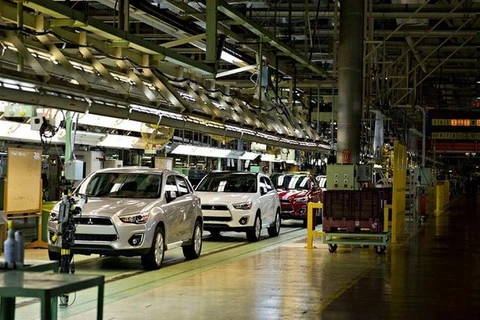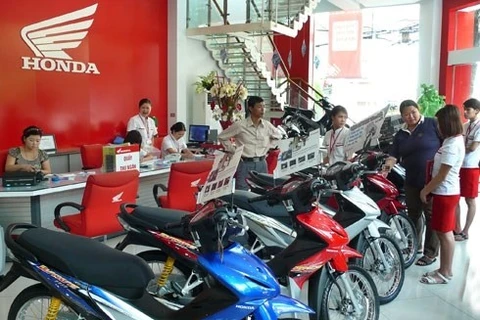Hanoi (VNS/VNA) - The Ministry of Finance has officially asked the Government to cut 50 percent of the registration fee for customers who buy locally-produced and assembled automobiles.
This is the key part of a governmental decree drafted by the finance ministry, which is expected to be applied from this month until the end of this year.
The draft decree was opened to ideas from ministries, sectors, localities, the business community, organisations and individuals before being sent to the Government for approval.
The ministry has received 47 contributions, including those from ministries of Foreign Affairs and Industry and Trade, to ensure compatibility between the decree with relevant international treaties, of which Vietnam is a member.
All participants agreed with the need for this decree for the development of the domestic automobile industry as well as its contents.
The ministry’s preliminary assessment shows that the cut of 50 percent of the registration fee for locally-manufactured and assembled vehicles will affect local budget revenue in the last six months of this year, with an estimated amount of 3.7 trillion VND (159 million USD).
According to current regulations, the buyers of cars with nine seats or less have to pay registration fee of 10 percent of the car value in cities and provinces, except for Hanoi, which applies a rate of 12 percent.
Meanwhile, buyers of pick-up trucks with transport volume of less than 1,500 kilos and five seats or fewer, and vans with capacity of 1,500 kilos or less, will pay an amount equal to 60 percent of the nine-seat car’s registration fee.
The average revenue generated by the registration fees on locally-manufactured and assembled vehicles is about 16 trillion VND per year.
Vietnam has initially controlled the COVID-19 pandemic, but the disease continues to affect countries around the world, showing no signs of slowing down. Many industries are heavily affected, including domestic automobile assembly and manufacturing.
During the social distancing period, most of the large car manufacturers and assemblers, such as Thaco, Thanh Công, VinFast, Toyota, Ford and Honda, had to suspend production and assembly activities, causing disruptions to supply chains and demand.
Insiders said that domestic automakers have restarted production and resumed supply chains, but due to the severe impact of the COVID-19 pandemic many difficulties lie ahead, especially for domestic automobile manufacturing and assembly enterprises who are dealing with high volumes of inventory.
It’s predicted that the automobile market will not only be impacted this year but also for a few years to come.
The Vietnam Automobile Manufacturers’ Association (VAMA) says its members units consumed nearly 19,100 various cars in May, up 62 percent compared with the previous month. Of the sales, there were more than 13,000 passenger cars, 5,800 commercial vehicles, and 260 special purpose vehicles.
VAMA members sold 83,200 cars of all types this year, down 34 percent year-on-year.
The above figure does not include sales from other brands, which are not VAMA members, including TC MOTOR, Audi, Jaguar Land Rover, Subaru, Volkswagen and Volvo.
TC MOTOR (representative of Hyundai Thanh Cong brand), saw the highest volume in May sales with 4,800 units, bringing the total sales in the first five months of this year to 22,400 vehicles of all kinds.
Experts said that Vietnam’s automobile market rebounded sharply in May because the country removed social distancing regulations in April, helping stimulate demand. In addition, many auto businesses have launched discount and promotional programmes for customers, so the May sales figures improved./.
This is the key part of a governmental decree drafted by the finance ministry, which is expected to be applied from this month until the end of this year.
The draft decree was opened to ideas from ministries, sectors, localities, the business community, organisations and individuals before being sent to the Government for approval.
The ministry has received 47 contributions, including those from ministries of Foreign Affairs and Industry and Trade, to ensure compatibility between the decree with relevant international treaties, of which Vietnam is a member.
All participants agreed with the need for this decree for the development of the domestic automobile industry as well as its contents.
The ministry’s preliminary assessment shows that the cut of 50 percent of the registration fee for locally-manufactured and assembled vehicles will affect local budget revenue in the last six months of this year, with an estimated amount of 3.7 trillion VND (159 million USD).
According to current regulations, the buyers of cars with nine seats or less have to pay registration fee of 10 percent of the car value in cities and provinces, except for Hanoi, which applies a rate of 12 percent.
Meanwhile, buyers of pick-up trucks with transport volume of less than 1,500 kilos and five seats or fewer, and vans with capacity of 1,500 kilos or less, will pay an amount equal to 60 percent of the nine-seat car’s registration fee.
The average revenue generated by the registration fees on locally-manufactured and assembled vehicles is about 16 trillion VND per year.
Vietnam has initially controlled the COVID-19 pandemic, but the disease continues to affect countries around the world, showing no signs of slowing down. Many industries are heavily affected, including domestic automobile assembly and manufacturing.
During the social distancing period, most of the large car manufacturers and assemblers, such as Thaco, Thanh Công, VinFast, Toyota, Ford and Honda, had to suspend production and assembly activities, causing disruptions to supply chains and demand.
Insiders said that domestic automakers have restarted production and resumed supply chains, but due to the severe impact of the COVID-19 pandemic many difficulties lie ahead, especially for domestic automobile manufacturing and assembly enterprises who are dealing with high volumes of inventory.
It’s predicted that the automobile market will not only be impacted this year but also for a few years to come.
The Vietnam Automobile Manufacturers’ Association (VAMA) says its members units consumed nearly 19,100 various cars in May, up 62 percent compared with the previous month. Of the sales, there were more than 13,000 passenger cars, 5,800 commercial vehicles, and 260 special purpose vehicles.
VAMA members sold 83,200 cars of all types this year, down 34 percent year-on-year.
The above figure does not include sales from other brands, which are not VAMA members, including TC MOTOR, Audi, Jaguar Land Rover, Subaru, Volkswagen and Volvo.
TC MOTOR (representative of Hyundai Thanh Cong brand), saw the highest volume in May sales with 4,800 units, bringing the total sales in the first five months of this year to 22,400 vehicles of all kinds.
Experts said that Vietnam’s automobile market rebounded sharply in May because the country removed social distancing regulations in April, helping stimulate demand. In addition, many auto businesses have launched discount and promotional programmes for customers, so the May sales figures improved./.
VNA
























